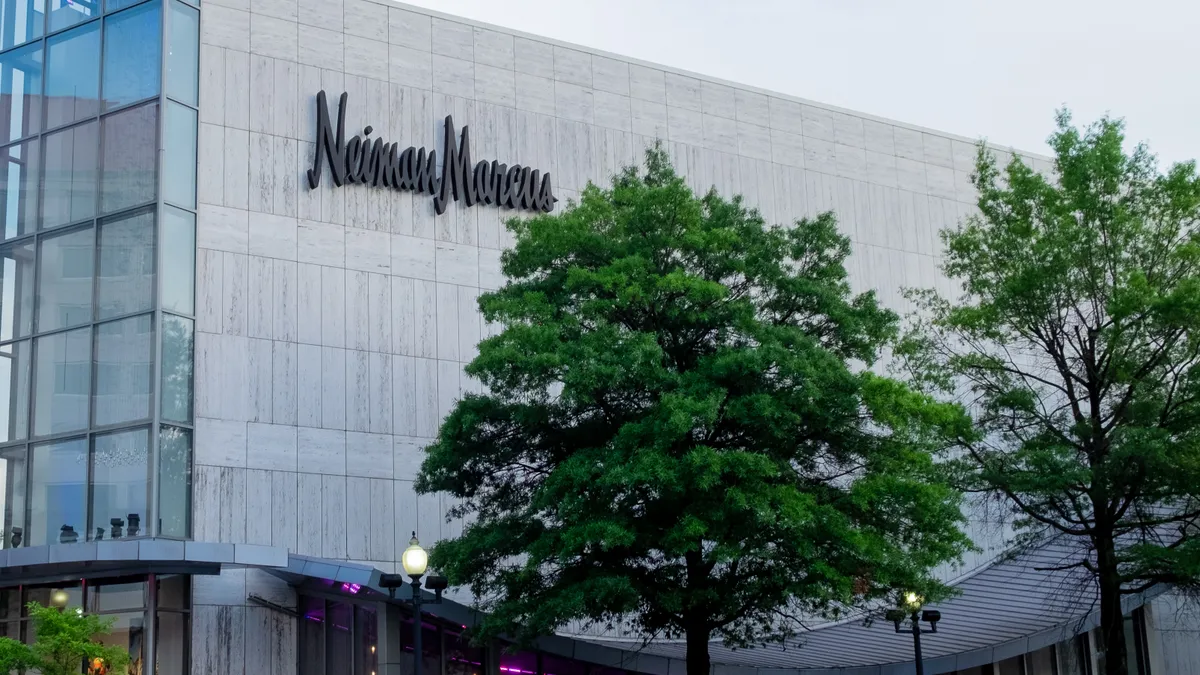Dive Brief:
- Dan Kamensky, the hedge fund leader who has waged legal battles against Neiman Marcus throughout its bankruptcy and going back to 2018, has been charged with fraud, extortion and obstruction of justice by federal prosecutors.
- Kamensky was arrested Thursday, after he allegedly abused his fiduciary role on a committee of Neiman creditors to potentially profit at the expense of other creditors, according to a Justice Department press release. Kamensky also faces charges from the SEC. A spokesperson said Kamensky has no comment on the charges at this time.
- Meanwhile, Neiman took another step toward reorganizing and exiting Chapter 11 in filing the third draft of its bankruptcy plan. A court confirmation hearing is scheduled for late Friday morning.
Dive Insight:
The story of Neiman's legal and rhetorical tussles with Kamensky goes back two years, after the company's private equity owners moved the fast-growing MyTheresa business out of the retailer's corporate umbrella and under an entity directly controlled by Neiman's private equity owners. Kamensky, who headed the hedge fund Marble Ridge, quickly threatened legal action, and soon after filed a lawsuit. He publicly called Neiman insolvent at the time and accused the retailer's owners of moving its most valuable asset out of the reach of lenders, who would suffer if the retailer ever defaulted.
Amid the tumult of COVID-19, Neiman indeed defaulted and filed for Chapter 11, with a plan worked out with key secured lenders to reorganize. Kamensky kept up the fight as co-chair of the committee of unsecured creditors assembled for the bankruptcy.
During the summer, he was vindicated in his years-long fight after an independent board member at Neiman acknowledged there was a likely legal claim against the company over the MyTheresa transfer. Additionally, an independent consultant found that Neiman Marcus had been insolvent at the time of the transfer, with its liabilities outweighing assets contrary to the rosy valuations presented by others with the company.
The prospect of a fraudulent conveyance lawsuit led to a settlement in bankruptcy between Neiman and the committee that would give creditors shares in the MyTheresa e-commerce business, whose value and revenue have more than doubled since Neiman acquired it in 2014.
As part of the plan for creditors, Kamensky made an offer to buy the MyTheresa shares from any creditors who would rather have cash than an equity stake in the company. According to prosecutors, he used his position to try to block the investment bank Jefferies from making a higher offer, so that he could boost his own potential profits off any MyTheresa stock he might buy. Making matters worse, prosecutors allege that after his efforts to block out Jefferies came to light, Kamensky tried to convince an employee of the bank to cover the incident up.
That would amount to an abuse of Kamensky's role as committee co-chair, which is tasked with representing the interests of an entire class of creditors in the bankruptcy process. Unsecured creditors like vendors who chose the cash-out option would suffer lower payouts for their claims against Neiman Marcus. Kamensky's dealings were unearthed during the bankruptcy process and led to a scathing report by the U.S. trustee overseeing the case, and ultimately the wind down of Marble Ridge.
It all amounts to another dramatic twist in the long saga at Neiman Marcus, which finally this year buckled under the debt from multiple leveraged buyouts. The company is trying to shed a massive chunk of that debt and move past bankruptcy. To that end, it filed yet another version of its plan to reorganize and emerge from bankruptcy.
That plan has the support of Neiman's secured creditors and the majority of those creditors who would be paid less than their total claims against Neiman. The one group that voted to reject that plan were creditors with funded unsecured claims, which amount to tens of millions of dollars, according to court papers. Those creditors could receive as little as 1.7% of their claims or up to roughly a third, depending on the ultimate value of the MyTheresa stock they would receive.
Neiman's bankruptcy plan requires court approval before the company can carry it out and exit Chapter 11.
















